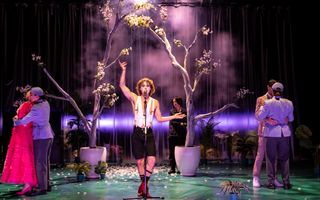VIOLA
I am not that I play.
Act 1, Scene 5
Viola is the twin sister of Sebastian, and the central character of the play. Separated from her brother during a shipwreck, Viola is rescued and arrives in the foreign land of Illyria, vulnerable, and hoping to seek employment to find her way in this new world. Viola’s saviour, the Captain, tells her of Lady Olivia, a countess who is grieving the death of her brother. Realising the obvious connection between their fates, Viola hopes to gain employment by serving Olivia. The Captain dashes her hopes, telling her that Olivia is not welcoming visitors into her home. Looking for other means, Viola instead decides to dress herself as a man, calling herself ‘Cesario’, and seeks employment in the house of Duke Orsino - a bachelor whom she had heard of back in her homeland of Messaline. Thus begins the disguise and mistaken identity that drives the primary narrative of Twelfth Night, and in the end, connects all the characters.
Viola’s journey through the play allows the audience to follow her as she deals with a mounting identity crisis, atmany times to great comic effect, but ultimately giving the audience space to witness an incredibly complex and engaging character. Throughout the play, Viola is playing both herself and Cesario, and sometimes playing both at once.Whilst keeping up the facade of Cesario with Orsino, she often reveals to him her true thoughts as Viola. No matter whom she is talking to, Viola is constantly having to decide which version of herself to reveal, and which to conceal. By managing to maintain this warring of personas, the audience is ultimately left with a character that is highly intelligent, practical and loyal. In a play about love, she is perhaps the character whose love is the purest, and her intentions the most selfless.
ORSINO
If music be the food of love, play on…
Act 1, Scene 1
Orsino is the Duke of Illyria. At the commencement of the play Orsino is in love with Olivia, and pining for his love to be requited. We get a very clear image of who he is from the moment he appears in the opening scene, insisting that the musicians keep playing. Melodramatic and longing in his love for Olivia, Orsino would prefer to sit and ruminate on his sorrows rather than do anything practical about his situation. All in all, Orsino loves the concept of love. He is a true romantic, and is in love with the idea of being in love. He is someone for whom love means ruminating over ideals, rather than in reality. He is willing to spend his days yearning for someone who has made it quite clear they have no romantic interest in him.
Despite his belief that Orsino is in servitude to real unwavering love, Shakespeare’s text certainly makes the instability of his desires clear. Orsino is a character who is in love with the idea of another person, rather than the person itself. At no point in the play do we ever see Orsino and Olivia share the stage, apart from the closing moments, making it hard for the audience to imagine the reality of their possible relationship. He likes to imagine what life with Olivia could be like, instead of what it would be like, and ultimately is quick to make Viola/Cesario the object of his affection at the end of the play. In doing so, Orsino’s sexuality becomes intriguingly ambiguous, as he continues to address Viola with the name Cesario, saying;
Cesario, come;
For so you shall be while you are a man;
But when in other habits you are seen,
Orsino’s mistress, and his fancy’s queen.
Act 5, Scene 1
OLIVIA
Love sought, is good; but given unsought, is better.
Act 3, Scene 1
Olivia is a wealthy countess and is widely admired with many hopeful suitors. The play opens with her in mourning for her brother, though she is quickly distracted by her attraction for Orsino’s new page, Cesario (Viola in disguise). Despite being adamant that she is not seeking love, Oliviabegins pining for Cesario in much the same way Orsino does over her. Given Olivia’s position as a countess, this immediately makes for an interesting character that steps outside of the social norms expected of her in Shakespeare’s times. A woman of Olivia’s position was expected to marry someone out of practicality as opposed to love, hoping to form advantageous alliances with other wealthy nobles. Orsino represents the image of a man that Shakespeare’s audience would have expected Olivia to favour, and yet she says, “I cannot love him.” (Act 1, Scene 5) In keeping with the theme of Twelfth Night, a night when social norms were turned upside down, Olivia decides instead to follow her heart instead of what’s expected of her - something she herself struggles to come to terms with. In Act 3, Scene 4, Olivia says “There’s something in me that reproves my fault / But such a headstrong potent fault it is / That it but mocks reproof.”
As with Orsino, Olivia’s sexuality is somewhat ambiguous. In her exchanges with Cesario, she loves who she sees as a man, but is in fact falling in love with a woman. Upon meeting Sebastian, Viola’s twin brother, she quickly falls for him and asks for his hand in marriage.
MALVOLIO
I’ll be revenged on the whole pack of you.
Malvolio, Act 5, Scene 1
Malvolio is Olivia’s steward, who harbours a secret love for his mistress. He is strait-laced, self-righteous, and self-obsessed . He is labelled ‘puritanical’ by the other characters in the play who bemoan his rigidity and distaste for drinking, partying and staying up all hours. Because of his attitude, Malvolio becomes the butt of a cruel trick played on him by Olivia’s uncle, Sir Toby Belch, his friend Sir Andrew Aguecheek, and Maria, Olivia’s gentlewoman. Malvolio’s ‘Achilles heel’ is that he is in love with Olivia and they capitalise on this by making him believe that Olivia loves him back. His desire to rise above his social standing was a dangerous game to play, and ultimately, he is left humiliated in front of the woman he loves, vowing to seek revenge on those who have wronged him: “I’ll be reveng’d on the whole pack of you.” (Act 5, Scene 1).
FESTE
Better a witty fool than a foolish wit.
Act 1, Scene 5
Feste is a jester within Olivia’s household. He is referred to as both fool and clown within the play, and as such, comments on the unfolding story through witty observation and song. He travels in and out of the play, providing musical interludes and song, as well as advice - "Better a witty fool than a foolish wit." (Act 1, Scene 5) We are told that Feste was a favourite of Olivia’s father, and so can assume he has been in the household for some time. As with many of Shakespeare’s fools, Feste appears foolish and silly on the surface, though makes wise statements that reveal his true intelligence and perceptive eye.
SIR TOBY BELCH
Dost thou think, because thou art virtuous, there shall be no more cakes and ale?
Act 3, Scene 2
Sir Toby Belch is Olivia's uncle. Olivia is kind enough to let Sir Toby live with her and take advantage of living in her household, yet throughout the play, his privileges become more and more at risk of being taken away. Sir Toby passes time drinking and carousing with his friend, Sir Andrew Aguecheek. Olivia disapproves of his penchant for drinking and revelry, and Maria and Malvolio spend much of the early parts of the play telling him off. That is, until Maria thinks her time would be better spent assisting Sir Toby in humiliating Malvolio – their shared enemy. Belch is the embodiment of one who follows Dionysian pleasures, the antithesis of Malvolio, and therefore the symbolic foil, represented on stage against the Puritan school of thought in Shakespeare’s time. Despite the other characters’ disdain for his behaviour, he refuses to be suppressed:
Confine! I’ll confine myself no finer than I am:
These clothes are good enough to drink in; and so be
These boots too: an they be not, let them hang
Themselves in their own straps.
Act 1, Scene 3
Sir Toby loves fun, mischief and practical jokes and plays them on Malvolio, Sir Andrew, and Cesario throughout the play. Towards the end of the play, fearing expulsion from Olivia’s home, Sir Toby calls off the jest against Malvolio. He and Maria leave the scene and are married offstage.
SIR ANDREW AGUECHEEK
Faith, I can cut a caper.
Act 1, Scene 3
Sir Andrew Aguecheek is a friend of Sir Toby’s. He has arrived in Illyria in hopes of courting Olivia, wanting to present himself as witty, wise, courageous, confident and a good enough dancer to be able to win her affection. In truth however, he is an ignorant, naive and argumentative character, and we see his presentation of wit fail spectacularly within the first few moments of meeting him. After a short battle of wits with Maria, one he struggles immensely to keep up with, he says; “Methinks sometimes I have no more wit / Than a Christian or an ordinary man has: but I am a / Great eater of beef and I believe that does harm to my wit”. (Act 1, Scene 3). Sir Andrew’s ignorance and naivety is both sad and entertaining to watch. He believes Sir Toby to be a good friend and is completely blind to the ways in which Sir Toby ridicules him and uses him for his money throughout the play. He’s ultimately goaded into challenging Cesario/Viola to a duel, despite his cowardice, hoping to win Olivia’s affection in the attempt. In truth, he gets trapped by his own stupidity into a fight with Sebastian that he couldn’t possibly win, ending the play badly injured and looking for a doctor.
MARIA
If you desire the spleen, and will laugh yourselves into stitches, follow me.
Act 3, Scene 2
Maria is Olivia’s intelligent and devious maid. While she chastises Sir Toby on Olivia’s behalf in an early scene, she quickly reveals a similar sense of humour and love of revelry, becoming the inventor of the scheme against Malvolio and an unforgiving prankster. She copies Olivia’s handwriting in order to fool Malvolio, saying; “I will drop in his way some obscure epistles of love.” (Act 2, Scene 3). Once Sir Toby calls off the jest, Maria leaves with him and they are married offstage.
SEBASTIAN
Of charity, what kin are you to me? What countryman? What name? What parentage?
Act 5, Scene 1
Sebastian is Viola's identical twin brother and plays a central role in first complicating then resolving the play’s main narrative. He is young, romantic, brave and rash, and after having survived the shipwreck, finds himself in Illyria, confused, and with no real plan. Throughout the play, he is constantly having to deal with the confusion caused by Viola’s disguise, leading him to wonder; “Are all the people mad”? (Act 4, Scene 1). Caught in his web of confusion, Sebastian valiantly goes along with his shifting circumstances, and gladly requites the love of Olivia in this new world that isn’t exactly kind to him; “If it be thus to dream, still let me sleep!” (Act 4, Scene 1). They are married shortly after their first meeting. He is very affectionate as a brother, and as a friend to Antonio in particular. In contrast to Orsino, who is a man of words, Sebastian is a man of action. He immediately jumps in to fight Sir Toby and Sir Andrew, without knowing who they are or what has happened. Sebastian’s arrival in the final scene clears up all the confusion the other characters have suffered, and his reunion with Viola shows their deep love for one another and close bond.
ANTONIO
Come what may, I adore thee so / That danger will seem sport, and I will go.
Act 2, Scene 1
Antonio is a sea captain and Sebastian’s rescuer, following the shipwreck. He insists that he will accompany Sebastian to Illyria and clearly cares deeply for his friend - “If you will not murder me for my love, let me be your servant” (Act 2, Scene 1). Antonio often makes declarations to Sebastian that appear to be of a romantic, sometimes melodramatic, nature. Despite Antonio’s potentially romantic feelings for Sebastian, his friend does not appear to requite the same feelings, a common theme for other characters in the play.





